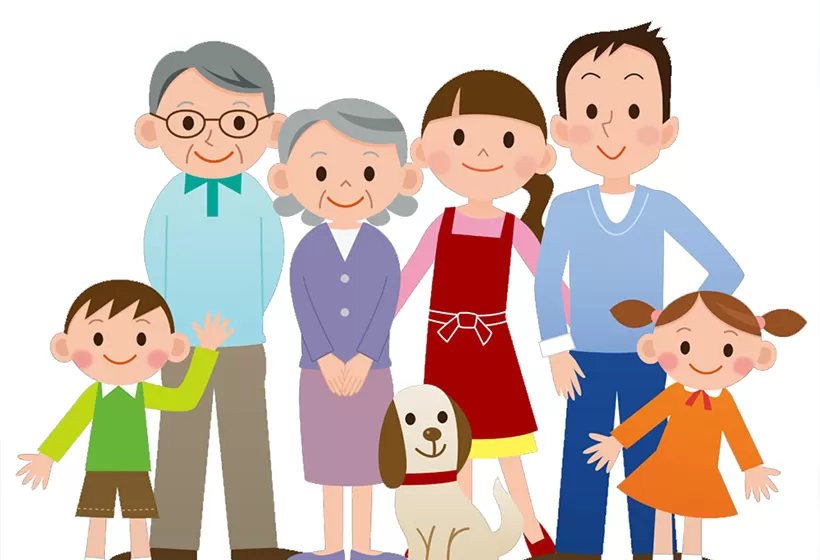Chinese Family Relationships
In terms of parents, the basic ethical requirement is that fathers should be righteous and mothers should be kind. Usually, kindness is the quality that parents should possess. The obligation of parents is to bring up their children and enlighten them on morally sound values so that they can get married and start a career.
Three changes occurring in family values at present
1. The shift from "traditional" to "modern" has led to the tendency for equality within a marriage to dominate family life and society. Democracy has superseded the patriarchal style over time, and consultation among family members is now on the increase. Meanwhile, fundamental changes are also occurring in the values regarding child-bearing.
2. The shift from dependence to independence has reduced family reliance on the state, just as freedom has increased within family life. Children now enjoy the freedom to pursue their own marriages, and dependence on the family is weaker. More women filing for divorce and getting remarried at later age are now widely accepted in society.
3. The shift from "closed" to "open" is a result of family lifestyles responding to societal change, along with the pursuit of improved living standards and quality of life. Family structure is less important, and old age support programs reduce the financial burden on the children as they are no longer solely responsible for providing financial support to their parents as in the past.
Meanwhile, there has been feverish speculation on various issues concerning family life, including concerns that:
- 1. Marital stability is now decreasing, with a shift in emotional focus within a married couple. This phenomenon can be seen nationwide, more marked in the coastal and developed areas. In recent years the divorce rate has increased as have such phenomena as a trial marriage, gold-digging, cohabitation (without marriage), unexpected pregnancy, extramarital affairs and domestic violence. There are also a growing number of children raised by single parents.
- 2. Intellectual development is overemphasized while moral education is neglected. It is widely perceived that pampered single children are more likely to be hedonistic, selfish, mentally weak and less independent.
- 3. The Neets (not in education, employment, or training) are on the rise and there are more elderly people abandoned by their children. Family bonds are less tight than in the past and children have become the focus of the family.
With regard to the status quo of the elderly living in urban areas, survey results indicate that most elderly people are satisfied with their current situation and expect to receive more old-age support and healthcare services than in the past. Naturally, they tend to feel insecure if they not receiving enough financial support. In Shanghai, the sense of insecurity is exemplified by fear of illness. Usually, an overwhelming majority of the elderly tend to spend their money on basic necessities and try their best to save for the future even though they are financially capable. Their social activities are quite simple. According to the survey, watching TV is a major part of life for 85% of the elderly. Only a few have computers or digital cameras and only a small portion know how to use mobile phones. Household chores make up 61.8% of their life. In addition, there appears to be a lack of confidence. The survey shows that 56.4% of the elderly believe that old-age support relies on families, 65.5% believe their future hinges on their families and 13.6% think they can rely on government support.
Old-age support should attend to the everyday life of the elderly both financially and psychologically. The responsibility of providing old-age support falls on the spouses, adult children and daughters-in-law of the elderly. With changes to social values, a host of problems are arising from the change away from the traditional way of old-age support.
1. Old-age support dependent on sons
In China, taking care of the elderly is the unshirkable responsibility of every adult son, ue both traditionally and legally. In rural areas, sons are expected to provide financial support for their parents and look after their daily needs. There is no specific standard for this. The amount of financial support is often negotiated among family members when the sons divide the family property and live apart. What's worth mentioning is that in rural areas the amount of financial support for the elderly remains unchanged once negotiated, even though the sons may become wealthier, and even though the cost of living may increase. If an elderly person suffers an accident then additional financial support, such as the medical bill, is usually shared by the adult sons. In terms of food support, the elderly usually distribute the farmland that is covered by the contract to their sons when they cease to be capable of working in the field. The sons then become responsible for providing food support to their parents. In terms of everyday care, in most cases, sons are obliged to take turns looking after their parents when they are no longer capable of taking care of themselves.
2. Old-age support dependent on married daughters
Traditionally, daughters are not obliged to provide old-age support for their parents in China. When their brothers divide up family property and live separately, daughters seldom inherit any farmland from their parents, and are not expected to care for their parents in the pact agreed upon by family members. In fact, most married daughters voluntarily shoulder equal responsibilities with their brothers, with various ways of caring for their parents. Following national reform, and the opening of China to the rest of the world, females enjoy an increasing role in the family and are given more freedom in family life. Therefore, they can take more initiative to look after their parents both financially and psychologically. In addition, there was a period during the reform when more rural families had only daughters. Legally daughters now have the same obligations as their brothers to provide support for their aging parents, and it is becoming quite common to see these rely on their married daughters.
3. Old-age support dependent on spouses
The elderly rely on their spouses for support if they are disabled (no longer capable of working in the field). As they age they are supposed to receive support from their spouses in farm work, household chores, and everyday care, as well as psychological support. The elderly have to rely on their spouses if they have no children or their children are in financial hardship. If they do have children, many of the elderly prefer not to live with them in order to avoid conflict arising from the generation gap, and also to reduce the burden on their children.
4. Old-age support dependent on daughters-in-law
Daughters-in-law play an important role in old-age support. Since the introduction of the reform and opening up of China many husbands leave their hometowns to work elsewhere for a living while their wives remain home looking after the fields, children and parents. Meanwhile, as females enjoy an increasing role in family life, they are more aware of their self-identity. As a result, they tend to pay less attention to their parents-in-law and more time looking after their own parents.
GREAT FAMILY CHINA TOUR
JULY 2024 We wanted to thank Grace at China Culture tour for organizing a great tour of China. We enjoyed our Beijing - Xian-Chengdu -Guilin -Yangshuo - Shanghai trip. Our local guides Bruce in Beijing, Susan in Xian, Jane in Chengdu, Mike in Guilin and Mary in Shanghai took care of us…read more details »
Teng Han L from SINGAPORE
Ready to Create a Unique Dream Travel?

